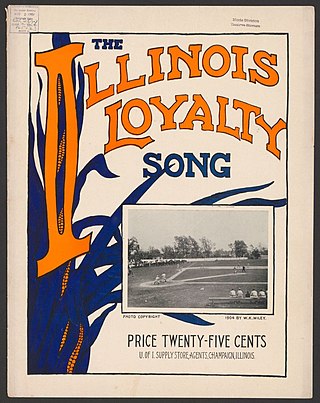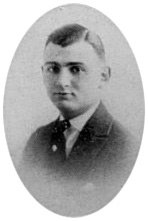A fight song is a rousing short song associated with a sports team. The term is most common in the United States and Canada. In Australia, Mexico, and New Zealand, these songs are called the team anthem, team song, or games song. First associated with collegiate sports, fight songs are also used by secondary schools and in professional sports.

"O Tannenbaum", known in English as "O Christmas Tree", is a German Christmas song. Based on a traditional folk song which was unrelated to Christmas, it became associated with the traditional Christmas tree.

"Far Above Cayuga's Waters" is Cornell University's alma mater. The lyrics were written circa 1870 by roommates Archibald Croswell Weeks, and Wilmot Moses Smith, and set to the tune of "Annie Lisle", a popular 1857 ballad by H. S. Thompson about a heroine dying of tuberculosis.
Bruin Warriors, also known as "Sons of Westwood" and "Big C", is a fight song of the University of California, Los Angeles (UCLA). The tune comes from Big C, a school fight song for the University of California, Berkeley. The UCLA Bruin Marching Band plays the song as part of their football pregame show as they move into the script UCLA formation. The song has been updated since 2016 with the new title "Bruin Warriors", and lyrics that include "daughters" as well as "sons".

"Illinois Loyalty", also known as "We're Loyal to You, Illinois" or just "Loyalty", is a song associated with the University of Illinois Urbana-Champaign. It is the school's alma mater. It is also used as the school's fight song.

"Carmen Ohio" is the oldest school song still used by Ohio State University. The song was composed by freshman athlete and Men's Glee Club member Fred Cornell in 1902 or 1903. According to some accounts, he composed it on the train ride home from Ann Arbor, Michigan after Ohio State suffered an 86-0 loss to the Michigan Wolverines. The song was set to the tune of "Spanish Hymn", or "Spanish Chant", and the Men's Glee Club first performed it in 1903; however, it did not gain popularity until after its publication in The Lantern on October 10, 1906. At the following Ohio State-Michigan football game on October 20, 1906, "Carmen Ohio" was published in the program. In 1915, Cornell recalled that he wrote the song in 1903 at the request of the Men's Glee Club, and other family members later stated that the train story might be an exaggeration or outright fabrication. Currently, after every home football game in Ohio Stadium, win or lose, the football team and the crowd sing the first verse of Carmen Ohio, accompanied by The Ohio State University Marching Band. It is also sung by new graduates at the end of the university's commencement ceremonies, after diplomas are distributed.

The "UNH Alma Mater" is the official alma mater of the University of New Hampshire in Durham, New Hampshire. The lyrics to the song were written by Herbert Fisher Moore, an 1898 graduate of the school, and are sung to the tune "Lancashire" by Henry Smart.

"The Sheik of Araby" is a song that was written in 1921 by Harry B. Smith and Francis Wheeler, with music by Ted Snyder. It was composed in response to the popularity of the Rudolph Valentino feature film The Sheik.

The Brown University Band is the official band of Brown University. Like all Ivy League bands except Cornell's, it is a scatter band. The Brown Band began performing on ice skates in 1970, and claims to be the world's best ice skating scatter band. It is the source of much of Brown's school spirit, and often appears as a public representation of Brown to the Providence community and to other universities. The Band is present at all home and away football games, various basketball and hockey games, as well as Commencement and other special events each year. It receives funding from Brown's Undergraduate Finance Board.

"On the Banks of the Old Raritan" is a song, or alma mater, associated with Rutgers, The State University of New Jersey, in the United States. The original lyrics were written in 1873 by Howard Newton Fuller, an 1874 graduate of Rutgers College. Fuller quickly prepared the song as a school hymn for the college's Glee Club, an all-male choral ensemble, before a performance in Metuchen, New Jersey. Fuller chose to set the lyrics to the tune of melody, "On the Banks of the Old Dundee", a popular Scottish melody regarded as a drinking song, and titled the song for the Raritan River.

The "Penn State Alma Mater" is the official alma mater of The Pennsylvania State University. The song was accepted by the university in 1901.
"Big C" is a fight song of the University of California, Berkeley. It was composed in 1913 by Harold P. Williams, with lyrics by Norman Loyall McLaren. It was written to commemorate the construction of the large concrete "C" in 1905 on the "rugged Eastern foothills" of the Berkeley campus. The song was the winning entry in the Daily Californian school song competition in 1913. Arrangements of the tune are used by other schools in the University of California system.

Columbia University has developed many traditions over its 269-year-long existence, most of them associated with its oldest undergraduate division, Columbia College.
"Bright College Years" is one of the traditional songs of Yale University, and the university's unofficial but undisputed alma mater. It was written in 1881 by Henry Durand and set to the tune of "Die Wacht am Rhein".

"Hail to Pitt" is the most traditional fight song of the University of Pittsburgh, which is commonly referred to as Pitt. The saying "Hail to Pitt!" is also the most traditional and commonly used slogan of the University of Pittsburgh and its athletics teams. The slogan is frequently used in promotional material, printed on merchandise and souvenirs. It was also the title of a 1982 history of Pitt athletics by author Jim O'Brien. The slogan is often used among alumni as a statement of affiliation, including as a closing signature in conversation or correspondence between alumni, and is sometime abbreviated as "HTP" or "H2P", the latter of which is a registered trademark of the university and is frequently used on official university signage and merchandise.

The "Pitt Victory Song", one of the most popular and widely used fight songs of the University of Pittsburgh, is often played in conjunction with "Hail to Pitt" and the "Panther Song". It was originally written by former to students of the university in order to solve the issue of the university not owning the copyright to "Hail to Pitt" which prevented the school from granting permission for its use during football radio broadcasts. Lyrics were written by G. Norman Reis and Louis M. Fushan. Music was written by Benjamin Levant. The song debuted in the Cap and Gown Club's 1938 musical production entitled Pickets, Please! Although commonly performed at university events, few people today know the rarely heard first portion of the song that occurs before the chorus. However, the most common cheer that is used during Pitt-related events and athletic contests is "Let's go Pitt!", which while perhaps derived from the song's lyrics, is often cheered even in absence of the song or music.

The alma mater of the University of Pittsburgh was adopted soon after the University changed its name in 1908 from the Western University of Pennsylvania to its current moniker. Lyrics were written by George M. P. Baird, class of 1909 and were set to the tune of what was then the Austrian National Anthem. A new tune for the "Alma Mater" hymn was composed by Charles W. Scovel, class of 1883, but it was not widely adopted and was either lost or became obscure.
"I'm a Tar Heel Born" is the official fight song of the University of North Carolina. It originated in the late 1800s or early 1900s as an add-on to the school's alma mater, "Hark The Sound". It was sung at a 1903 baseball game against Brown University, and was soon after adapted for the Brown University fight song “I’m a Brown Man Born”. The song was also adapted for the University of Rhode Island's fight song "We're Rhode Island Born", as well as the tag in the University of Oklahoma's fight song Boomer Sooner in 1906. Today, the song is almost always played immediately after the singing of "Hark The Sound", even during more formal occasions such as convocation and commencement. Just before home football and basketball games, the song is played by the Bell Tower near the center of campus, and is often played after major victories. Bleacher Report raked it as the 24th best college football fight song.

The Georgetown University Alma Mater is one of the traditional songs of Georgetown University, and the university's official and undisputed alma mater. It was written to the tune of the Welsh battle song Men of Harlech in 1894 by Robert J. Collier, a Georgetown student. The song is performed by the university orchestra and occasionally other groups at various school events, including commencements and athletic games.
"Stand, Columbia" is the official alma mater of Columbia University in New York City, New York. It was written in Gilbert Oakley Ward for the university's 1902 Class Day ceremonies, and is sung to the tune of Joseph Haydn's "Gott erhalte Franz den Kaiser", which served as the melody for the Austrian national anthem until 1938, and was adopted as the German national anthem in 1922. The hymn is traditionally played at the university's baccalaureate services and commencements.














